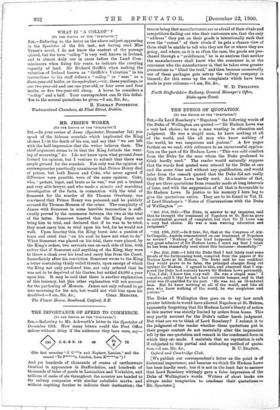MR. JESSE'S WORKS.
[To THE EDITOR OF THE "SPECTATOR."]
SIR,—In your review of Jesse (Spectator, December 1st) you speak of the hideous scandals which implicated the King (James I.) in the death of his son, and say that "we are left with the half-impression that the writer believes them. The chief argument seems to be that the King forbade the wear- ing of mourning," &c. I do not know upon what ground Jesse formed his opinion, but I venture to submit that there was ample ground for the scandals. Not only was the opinion of contemporaries practically unanimous that Prince Henry died of poison, but both Bacon and Coke, who never agreed if difference were possible, were of the same opinion. Coke, who, " pedant, bigot, and brute as he was," was yet a trained and very able lawyer, and who made a minute and searching investigation of the facts, in connection with the trial of Somerset for the murder of Sir Thomas Overbury, was convinced that Prince Henry was poisoned, and he publicly accused Sir Thomas Monson of the crime. The complicity of James with Somerset in some horrible transaction is suffi- ciently proved by the commerce between the two at the trial of the latter. Somerset boasted that the King durst not bring him to trial, and declared that if he was to be tried, they must carry him to trial upon his bed, for he would not walk. Upon hearing this, the King burst into a passion of tears and cried that " on his soul he knew not what to do." When Somerset was placed on his trial, there were placed, by the King's orders, two servants one on each side of him, with orders that if Somerset said anything of the King, they were to throw a cloak over his head and carry him from the Court. Immediately after his conviction Somerset wrote to the King a letter containing thinly veiled threats, upon receipt of which the King not only pardoned him, not only ordered that he was not to be deprived of his Garter, but settled £4,000 a year upon him. It may be said that there is another explanation of this leniency, but this other explanation will not account for the pardoning of Monson. James not only refused to go into mourning for his son, but would not visit him upon his






































 Previous page
Previous page